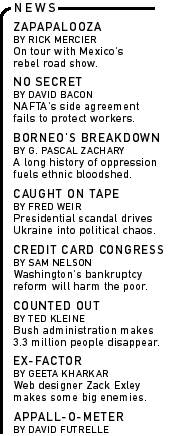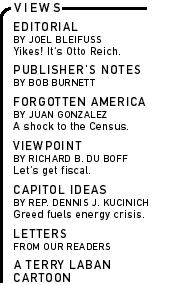

|

|

|

|
| |
|
|
|
Just before he assumed office in January 1993, Bill Clinton proposed a $31 billion increase in federal spending to stimulate a sluggish economy. In a matter of days, he halved it, then dropped it altogether in the face of opposition from Republicans, conservative Democrats, Federal Reserve Chairman Alan Greenspan and his own economic advisers. Fiscal discipline and deficit reduction became the order of the day. It's eight years later, and gone from Democratic Party discourse is any notion of increasing government spending to promote economic growth, or even cutting taxes--at least until President George W. Bush began pushing neo-Reagan tax cuts upon taking office. "Almost all economists now agree," declares liberal economist and New York Times columnist Paul Krugman, "that monetary policy, not fiscal policy, is the tool of choice for fighting recessions." The government, Krugman advises, should be "out of the business of short-term economic management." Robert Litan of the Brookings Institution puts it this way: "Fiscal policy as a tool of macroeconomic policy is dead. The thinking now is that any fine-tuning should be left to the Fed"--reducing interest rates when the economy is weakening, increasing them if it overheats. But the track record of such monetary policy is notoriously bad. The Fed cut interest rates 18 times from 1989 to 1992, for example, but not until 1996 did the economy grow as fast as it typically does when recovering from the trough of a recession. Not to worry, however. The conservative New Democrats do have a "fiscal policy": running federal budget surpluses every year and using the proceeds to pay down the national debt. Few liberal economists would go as far as Al Gore did in February 2000, when he said that if the economy ever slowed down enough to turn budget surpluses into deficits, he would still pursue debt reduction by cutting spending, "just as a corporation has to cut expenses if revenues fall off." But in December, Krugman criticized Dick Cheney's call for a tax cut to counter a looming economic slowdown as a "bad idea." Why? Not because Cheney's remarks were crassly opportunistic, but because they were "those of a vulgar Keynesian." The emasculation of Keynesian fiscal policy is a bipartisan accomplishment. Differences between Democrats and Republicans are now limited to a reactionary debate between debt cutters and tax cutters--with the Democrats lock-boxing themselves into strangulation of federal spending on everything except the military. It's distressing that the "best and the brightest" cannot even imagine legislation that would give the president more flexibility over the amounts and timing of some kinds of spending during economic downturns, or give wage-earners immediate tax rebates of, say, $250 to $500 per household. Or how about cuts in tax withholdings concentrated at the lower end of the income scale? The prime target here would be cuts in Social Security payroll taxes (FICA), with no loss of future benefits. FICA reductions would also bring income redistribution, since this tax hits lower-income workers harder (its flat 6.2 percent rate is levied on only the first $80,400 of earned income, not beyond). Aren't these issues that need to be placed on the public agenda, even though--or precisely because--they are unthinkable for the time being? Even more remarkably, New Democrats ignore a whole set of fiscal policy tools--"automatic stabilizers"--that produce the desired countercyclical effects on their own (with no legislation or any other discretionary action needed) by pumping more spending into the economy during a recession and doing the reverse as the economy expands toward full employment and a possible upturn in inflation. The key automatic stabilizers are graduated-rate (progressive) income taxes, unemployment compensation, welfare payments and food stamps. Starting in 1981, three presidential administrations have gutted them. The only exception was Clinton's 1993 tax increase, which restored a small degree of progressivity to federal income taxes; but it was matched by "ending welfare as we know it." Rebuilding the stabilizers urgently needs to be addressed. So does renewed government spending on education, medical care and other public investments far more valuable than private spending on SUVs and designer boutiques. Even with the noblest intentions on the part of its practitioners (a charitable assumption), monetary policy remains the private preserve of the financial elite and undemocratic in its formulation and execution--as wonderfully exemplified by the Delphic pronouncements of Alan Greenspan. Fiscal policy is by its nature different. Unlike monetary policy,
it has potential for redistributing income from rich toward poor.
And its tools--spending and taxing--make all of us direct participants.
Nearly every fight for social and economic reform has been waged,
and sometimes won, on the fiscal battlefield. One looks back almost
with incredulity on the spectacle of the past two decades--that
so much of what was gained since the '30s has been snatched away
by the phalanxes of the right, whose triumphs were ratified by a
New Democrat in the White House during the '90s. It's high time
to start waging fiscal war again. Richard B. Du Boff is professor emeritus of economics at Bryn Mawr College.
|

